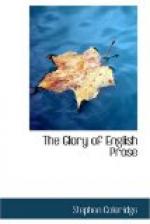“Where by divers sundry old authentic histories and chronicles it is manifestly declared and expressed that this realm of England is an Empire, and so hath been accepted in the world, governed by one supreme head and King having the dignity and royal estate of the imperial crown of the same, unto whom a body politic compact of all sorts and degrees of people, divided in terms and by names of spiritualty and temporalty being bounden and owen to bear next to God a natural and humble obedience; he being also institute and furnished by the goodness and sufferance of Almighty God with plenary whole and entire power pre-eminence authority prerogative and jurisdiction to render and yield justice and final determination to all manner of folk residents or subjects within this his realm, in all causes matters debates contentions happening to occur insurge or begin within the limits thereof without restraint or provocation to any foreign princes or potentates of the world ... all causes testamentary, causes of matrimony and divorces, rights of tithes, oblations and obventions ... shall be from hence-forth heard examined licenced clearly finally and definitely adjudged and determined within the King’s jurisdiction and authority and not elsewhere.”
The words “Empire” and “Imperial” are in the present day degraded from their ancient high estate by an appropriation of them to advertise soap or cigarettes or what not; and we even are confronted with the “Imperial” Cancer Research Fund, the money of which has been employed in artificially inflicting cancer on hundreds of thousands of living animals—a performance utterly repugnant to a great many of the inhabitants in the “Empire”!
But people indifferent to the dictates of mercy are not likely to have much reverence for words, however august.
Henry VIII., we may be sure, would never have allowed these solemn words to be used by people with something to sell, or by scientific disease-mongers.
They were great people who could draw up their statutes in splendid passages of sustained nobility.
Let us, Antony, salute them across the centuries.
Your loving old
G.P.
5
MY DEAR ANTONY,
One of the great creators of English prose who lived at the same time as Ralegh and Shakespeare was Richard Hooker, who is generally known as “the Judicious Hooker.”
He was born in Devon, two years after Ralegh, in 1554.
He must very early in life have made his mark as a man of learning and piety, for when he was only thirty-one he was made Master of the Temple. The controversies in which he there found himself involved induced him to retire when he was only thirty-seven into the country, for the purpose of writing his famous books, The Laws of Ecclesiastical Polity.
It is the first great book on the English Church, and it is full of magnificent prose. It was divided into eight parts; and in the first one, before he had got far into it, he penned the exclamatory description of law which will live as long as the language:—




